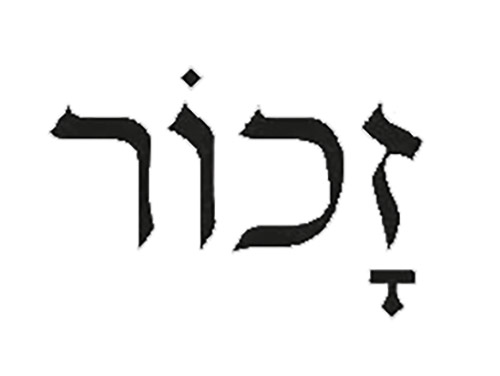
One of my friends had a car whose speedometer was broken for quite a while. I often asked him, “Why don’t you get it fixed? Don’t you need to know how fast you’re going?” He said he relied on his own sense of speed. A few months later, I noticed he had fixed the speedometer. “Yes, I got pulled over for speeding. I thought I was doing fine! Oh well…” The lesson is, some things in life are hard to measure when you’re missing a meter.
This week, Parshas Zachor discusses how Amalek attacked the Jewish nation after the splitting of the sea. During that battle with Amalek, Moshe stood at the top of a nearby mountain with his arms stretched straight up to heaven. The Torah states that when Moshe lifted his hands, the Bnei Yisrael gained ground, and when he lowered them they lost ground. The Mishnah questions: Was it the hands of Moshe that determined victory or loss in the battle? The Mishnah answers that Moshe’s hands were only a sign for Bnei Yisrael to look toward heaven and have faith in Hashem for their victory. When their faith was elevated, they were victorious, and when their faith was lowered, they lost ground.
The Sfas Emes notes that if indeed Moshe’s hands were the key to the victory over Amalek, how did Moshe even dare lower his hands? He offers a novel interpretation of the Mishnah’s answer. The key to the victory of Bnei Yisrael was their emunah (faith) in Hashem. Moshe’s hands served as the device to measure the strength of their faith. When their reliance on Hashem was absolute, Moshe’s hands remained stretched straight up and they were victorious. When the people’s emunah wavered, Moshe’s hands lowered, signaling them to increase their faith. This is clear from the words of the next pasuk, “Moshe’s hands were emunah.” Hashem was gifting them with a crucial meter to measure their emunah.
Vigilance over one’s faith can avoid war altogether! It was the weakening of Bnei Yisrael’s emunah that opened the door for Amalek to attack to begin with. Rav Wolbe notes that the parsha preceding Amalek’s attack quotes the Bnei Yisrael asking, “Is Hashem amongst us?” Of course they actually knew: Hashem had just performed multiple miracles both in Mitzrayim and with the splitting of the sea. They just questioned the level of Hashem’s involvement with them as individuals. As a result, says Rashi, Hashem allowed Amalek to attack and then saved Bnei Yisrael, showing that Hashem was constantly protecting them individually and they should not lose sight and focus on their relationship with Hashem for a moment.
There was another deficiency in Bnei Yisrael that allowed Amalek to attack. “And they fought with Bnei Yisrael in Refidim.” The Gemara points out that the Torah’s naming of that place is significant. The word refidim is a composite of the words “rafu yedeihem”—Bnei Yisrael weakened their hands—in Torah study. Slackening in Torah study gave Amalek the power to attack.
But why express this with the words “weakened their hands” in words of Torah? Why not their hearts or their minds? Not only that, but the Torah was not yet given! This attack took place after the splitting of the sea, before klal Yisrael received the Torah.
I believe the answer is that when something is precious to you, a person holds on tight. The people knew they were on their way to receiving the Torah, yet they loosened their grip on the significance of the momentous gift they were about to receive. This lowered their Divine level of protection and empowered Amalek.
Our war against Amalek is ongoing, as stated in the pasuk “…in each generation, Amelek is at war with Hashem.” Rav Elchonon Wasserman said that “Amalek” is not limited to the nation itself. Any person, group or nation that maliciously attacks the Jews for no cause is considered part of the nation of Amalek.
The Sfas Emes notes that the terminology used in the Torah regarding Moshe lifting and lowering his hands is written in the future tense—when Moshe “will lift or lower his hands.” This alludes to the future generations that metaphorically cause the hands of Moshe to be lifted or lowered, signifying the level at which Bnei Yisrael are currently committing to Torah and closeness to Hashem.
Rav Wasserman concludes that each time we learn Torah we are actually lessening the power of Amalek and are fulfilling the mitzvah of wiping out Amalek. Our emunah goes hand in hand with our commitment to Torah study, giving us the strength not just to survive but also to live a full and enriching life.
Rabbi Baruch Bodenheim is the associate rosh yeshiva of Passaic Torah Institute (PTI)/Yeshiva Ner Boruch, where he leads a multi-level Gemara-learning program. PTI has attracted adult Jews of all ages from all over northern New Jersey for its learning programs. Fees are not charged but any contributions are always welcome. Beyond PTI, Rabbi Bodenheim conducts a weekly beis midrash program with chavrusa learning in Livingston plus a monthly group in West Caldwell. Rabbi Bodenheim can be reached at [email protected]. For more info about PTI and its Torah classes, visit www.pti.shulcloud.com.










